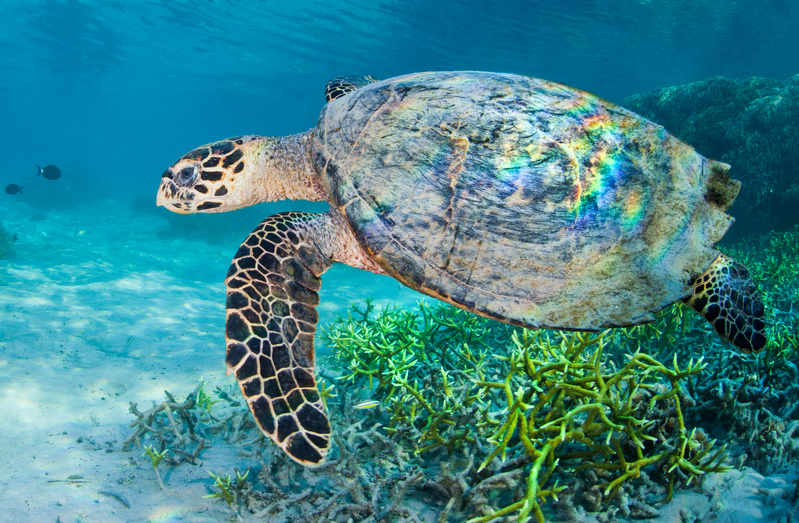Our oceans’ last chance: a historic opportunity

This is so exciting! For the next two weeks, there will be negotiations on a Global Ocean Treaty at the UN. It’s such a historic opportunity, scientists are calling it “The last chance for the oceans”, and that’s exactly what it is!

A hawksbill turtle swims past a boat in the waters off Larantuka, Flores, Indonesia. © Paul Hilton
What is so special about this treaty?
It’s hard to believe, but it’s true: Currently, the global oceans beyond national borders, also known as the high seas, which cover about two thirds of the blue on our planet, are almost completely unprotected. There are several treaties and organisations that are responsible for the high seas – but mainly to use and exploit, not to protect them. Now we have a chance to change that: Under the Global Ocean Treaty, a vast network of sanctuaries across our world’s oceans would be possible, protecting at least 30% of them by 2030.
Why is it so important that the oceans are protected globally?
The oceans are the largest habitat on Earth, the greatest source of food for animals and humans. Every second breath we take comes from the sea. Without the oceans, we cannot survive on this planet. And out there is not only water – it is a wonderful world teeming with life! The blue open waters of our global oceans are home to a diversity of wildlife, including turtles, whales, sharks and dolphins. And even far below, on the seafloor, enigmatic cold-water coral reefs and sponge gardens thrive in the pitch dark – often making up the living cover of giant ancient seamounts providing shelter for deep-sea fish and many other creatures. It’s a mysterious world we have just begun to understand. But one thing is already clear: If we don’t protect it now, we will lose it before we even get to really know it.

A Manta ray swims through the plankton-rich waters off the coast of Nusa Penida, where major ocean currents converge between the Pacific and Indian Ocean. © Paul Hilton
Is marine life on the global oceans not safe?
That’s how it was until the last century. But today, with industrial fishing, pollution and even seafloor mining on the rise, marine life is in more danger than ever: Modern fishing fleets penetrate even the remotest areas and deepest depths of the seas. Million tons of fish get caught in nets and lines every year – and with them tens of thousands of turtles, sharks and dolphins. At the same time, about eight million tons of plastic waste enter our oceans every year, turning them into the biggest waste dump on this planet, choking and drowning many of their inhabitants. And last but not least, the effects of climate change such as ocean acidification and global warming make ocean protection more urgent than ever. This leaves me sad and angry! Marine life deserves a rest. And that’s why we need ocean sanctuaries that are off-limits to extractive and destructive activities, where all those amazing creatures can recover and thrive.
Scientists call for at least 30% of the world’s oceans to be protected by 2030, both within and beyond national borders. But so far only 1% of the global oceans are protected.
That is why a Global Ocean Treaty is so important. We need a whole network of marine sanctuaries around the globe. And that would make that possible.
What exactly is the meeting in New York about?
The next two years are crucial: Will governments of the world recognise their responsibility and put the goal of ocean protection above business interests? Now is the moment to set the right course. The negotiations will last until 2020 and the fight is just beginning. To bring real change, the Global Ocean Treaty needs to have the power to create, via its Member States, ocean sanctuaries with effective protection measures across the global oceans. Greenpeace will work for this with all our strength. We will be on the ground in New York to remind governments what this is all about: a wonderful world full of life that we must preserve for our children and grandchildren.
About Louisa Casson
I'm a campaigner in Greenpeace UK's oceans team, leading our campaign to create the world's largest protected area in the Antarctic ocean.



